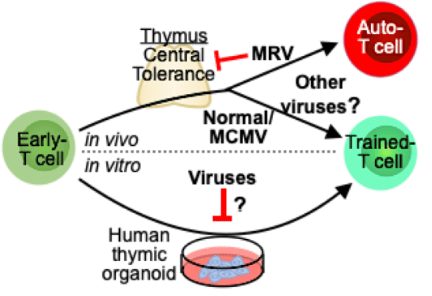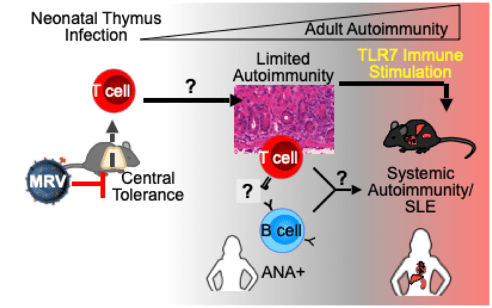Evaluate the impact of murine roseolovirus (MRV) and other thymotropic viral infections on T cell development and central tolerance in vivo and in organoids
We are using transcriptomic and proteomic approaches to understand how roseoloviruses and other thymotropic viruses alter central tolerance in vivo. Additionally, we are creating cell culture tools to study the impact of infection in simplified systems in vitro. Using these approaches, we will identify the mechanism of virus-induced autoimmunity in mice and in human cells.

Delineate how disruption of immune development by viruses during the neonatal period results in T and B cell dysregulation that promotes autoimmunity
We have found the neonatal MRV predisposes mice to systemic autoimmunity after additional immune stimulation. We are studying the mechanism by which this occurs in our mouse model and comparing this to systemic autoimmunity in humans.

Identify therapeutic targets in virus-induced immune dysregulation and autoimmunity
Our studies identifying the mechanism of virus-induced autoimmunity and the phenotypic markers of that transition from health to autoimmunity will be utilized to discover how and when to screen and treat autoimmune diseases.

Explore the role of MRV CNS infection in encephalitis and neurodegeneration
We have shown that MRV infects the CNS and induces neuroinflammation. We will continue to pursue understanding how roseoloviruses contribute to neuroinflammation and neurodegeneration in the setting of immunodeficiency and stressors that induce reactivation.
Investigate basic roseolovirus virology
There remains much to be explores regarding roseolovirus biology that is difficult to perform for the human roseoloviruses. We will explore these questions in vivo using MRV.
Translational studies on inborn errors of immunity
As a clinical rheumatologist and immunologist, Bigley see patients with rare inborn errors of immunity. The Bigley lab is interested in identifying the functional impact of rare genetic variants in genes involved in immune regulation to advance the field of immunology, virology and potentially improve patient outcomes.